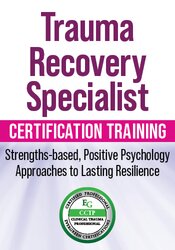

”I’m not myself anymore.”
I’m broken.”
”I can’t let go of what happened.”
As a therapist, you’ve likely heard these words from clients who feel defined by their trauma.
And while traditional treatments manage symptoms, many still struggle to reclaim their sense of wholeness.
That’s where the Trauma Recovery Specialist Certification Training comes in. Led by Dr. MaryCatherine McDonald – renowned researcher, author and trauma survivor – and Taune Lyons, LMFT, seasoned clinician and Somatic Experiencing Practitioner, this course offers a groundbreaking, strengths-based approach to trauma recovery.
What you’ll gain:
Upon completion, you’ll be eligible for the Certified Clinical Trauma Professional (CCTP) credential, proving your commitment to top-tier trauma care. Plus, your first year of certification is FREE (a $99.99 value)*!
*Professional standards apply. Visit www.evergreencertifications.com/CCTP for professional requirements.
Continuing education credit information is coming soon for this live webcast.

MaryCatherine (MC) McDonald, PhD, is a research professor and author specializing in trauma, stress, and resilience. With over a decade of experience researching and teaching the neuroscience and psychology of trauma, she is passionate about destigmatizing mental health and reframing trauma as a strength-based response.
Dr. McDonald earned her master’s degree at The New School, researching traumatic loss, and completed her PhD at Boston University. She has published extensively, including her latest book, Unbroken: The Trauma Response is Never Wrong (and other things you need to know to take back your life), released in 2023 by Sounds True.
In her thriving coaching practice, she has worked with combat veterans, survivors of sexual assault, individuals navigating career transitions, and more. Since 2010, she has also developed trauma-based curricula for nonprofits across the US.

Taune Lyons, LMFT, brings a wealth of specialized expertise in trauma and integrative therapeutic practices. With a master’s in integral counseling psychology from the California Institute of Integral Studies, Taune is currently advancing in Somatic Experiencing, having trained under experts like Berns Galloway, Abi Blakeslee, and Linda Stelte. Her professional development includes in-depth workshops with leaders in trauma and attachment, including Gabor Maté and Peter Levine, as well as advanced training in clinical applications of the adult attachment interview, sex therapy under AASECT-approved supervisor Gail Guttman, and couples therapy with the Couples Center. Additionally, Taune’s grounding in interpersonal neurobiology, meditation, and nonviolent communication adds a layered, integrative approach to her trauma recovery work, making her an invaluable resource in this training.
For live CE credit, you must watch the live webcast in its entirety at its scheduled time and complete the CE quiz and evaluation within one week. You will have access for 90 days after the program for review.
Please note: There will be a 70-minute lunch and two 15-minute breaks; one in the morning and one in the afternoon. Lunch and break times will be announced by the speaker and at their discretion. A more detailed schedule is available upon request.
Visit our FAQ page at www.pesi.com/faq or contact us at www.pesi.com/info
Satisfaction Guarantee
Your satisfaction is our goal and our guarantee. Concerns should be addressed to: PO Box 1000, Eau Claire, WI 54702-1000 or call 1-800-844-8260.
ADA Needs
We would be happy to accommodate your ADA needs; please call our Customer Service Department for more information at 1-800-844-8260.
PESI Mobile App
Access CE trainings on your phone or tablet through our free mobile app. Choose video or audio-only versions of online courses from the world’s best instructors, and complete your CE requirements anywhere, anytime, at your own pace.
Please wait ...